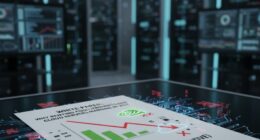To stay resilient against AI, focus on developing skills like emotional intelligence, complex judgment, and creativity, which AI struggles to replicate. You should excel in areas such as empathy, cultural awareness, and nuanced decision-making that require human insight. Collaboration, ethical reasoning, and strategic thinking are also essential. If you continue exploring, you’ll discover how embracing these qualities can help you build a future-proof career in an AI-driven world.
Key Takeaways
- Skills involving emotional intelligence, such as empathy and cultural awareness, are highly resistant to AI automation.
- Complex problem-solving and ethical reasoning remain human-centric, making them less vulnerable to AI replacement.
- Creative thinking and innovative judgment in uncertain contexts are key skills that AI cannot replicate effectively.
- Interpreting subtle cues and managing ambiguous human scenarios require nuanced understanding beyond AI capabilities.
- Roles emphasizing moral judgment, social connection, and interpersonal interactions offer greater career resilience against AI advancements.

Are your skills prepared to withstand the rapid advance of AI and automation? As technology accelerates, certain careers remain resilient because they depend on uniquely human qualities. Jobs that require emotional intelligence, like teaching, healthcare, or counseling, are less vulnerable since they involve complex interpersonal interactions that AI can’t replicate. Positions that demand nuanced decision-making or intricate problem-solving also stay safe because AI still struggles with tasks that go beyond pattern recognition. Occupations involving moral judgment, ethical reasoning, or considerations of context are equally resistant, as they hinge on human values and societal norms that machines can’t fully grasp. Additionally, roles demanding creativity and innovative thinking—especially under uncertain conditions—are less likely to be overtaken by AI, which excels at routine tasks but falters when faced with novel challenges. Industries such as education, mental health, and social services, where human expertise multiplies value, remain essential and immune to automation. Furthermore, roles that require a deep understanding of cultural nuances and emotional subtleties are inherently resistant, emphasizing the importance of emotional intelligence in sustaining career resilience.
To thrive alongside AI, you should develop skills that complement these systems. Interpreting and critiquing AI outputs for bias or inaccuracies becomes essential, ensuring decisions are fair and reliable. Designing AI tools to solve morally complex, human-centric problems also positions you as a critical participant in technology development. Managing workflows that blend human judgment with AI automation helps optimize efficiency while safeguarding quality. Facilitating collaboration between technical and non-technical teams enhances project success, as you bridge gaps and translate needs into effective solutions. Providing contextual understanding and nuanced judgment in ambiguous scenarios makes you indispensable because AI often lacks the ability to interpret subtle cues or cultural nuances.
However, AI has clear limitations. It performs poorly when training data contain systemic biases, which can lead to unfair outcomes. Tasks requiring extrapolation beyond existing data or strategic insight remain challenging, as AI lacks true understanding and reasoning. It also struggles with moral and ethical dilemmas in ambiguous situations, often defaulting to rules or patterns rather than genuine judgment. While AI excels at repetitive tasks, it fails at adaptive reasoning and strategic thinking, highlighting the importance of human oversight. These functional limitations create opportunities for you to specialize in areas where AI is weak, emphasizing the importance of developing skills in AI development, ethical oversight, and soft skills like communication and empathy.
Frequently Asked Questions
How Can I Identify Ai-Resistant Skills in My Industry?
To identify AI-resistant skills in your industry, start by analyzing tasks that need empathy, complex ethical judgment, or creativity—areas where AI still struggles. Focus on roles involving relationship-building, nuanced decision-making, or personalized interactions. Look for tasks requiring moral reasoning or innovation beyond data patterns. By understanding which skills demand human intuition, emotional intelligence, and moral oversight, you can better develop and protect those abilities in your career.
Are Soft Skills More Immune to Automation Than Technical Skills?
Thinking soft skills are completely immune to automation? Ironically, many believe technical skills are more at risk, but that’s not true. You’ll find that soft skills like empathy, adaptability, and critical thinking actually hold up better against AI. While machines can mimic complex data analysis, they struggle with genuine human connection. So, investing in soft skills isn’t just smart—it’s your best defense in a rapidly changing job landscape.
How Often Should I Update My Skillset to Stay Ai-Proof?
You should update your skills regularly to stay ahead of AI advancements. Aim for annual refreshers, especially in fast-changing sectors like tech and data analysis. Keep learning new tools, hone your emotional intelligence, and develop critical judgment. By staying proactive, you’ll maintain your relevance and adaptability, ensuring you’re always equipped to handle new challenges and leverage AI as a support rather than a threat.
What Role Does Creativity Play in Career Immunity?
Think of creativity as your personal shield in the AI era. It’s the spark that fuels ideas AI can’t replicate—understanding nuance, emotion, and moral judgment. You play a crucial role in shaping meaningful, original work that resonates deeply. By honing your creative skills, you become a lighthouse guiding your career through the fog of automation, ensuring your work remains valuable, relevant, and human-centered in a world increasingly driven by machines.
Can AI Ever Fully Replace Human Intuition and Judgment?
You might wonder if AI can ever fully replace human intuition and judgment. While AI excels at data-driven tasks, it can’t match your ability to navigate ambiguity, ethics, and emotional nuances. Your intuition guides you through complex, subjective decisions that require moral judgment and empathy. AI’s limitations in extrapolation, bias recognition, and moral understanding mean you’ll always bring essential qualities to roles that demand human insight.
Conclusion
If you focus on honing uniquely human skills like empathy, creativity, and critical thinking, you’ll build a career fortress that even AI can’t breach. These skills are your secret weapons, making your work as irreplaceable as a rare gem in a sea of imitation. Don’t wait for the future to catch you off guard—arm yourself now. Master these qualities, and you’ll stand tall, unshakable, in a world rushing toward automation’s relentless tide.









